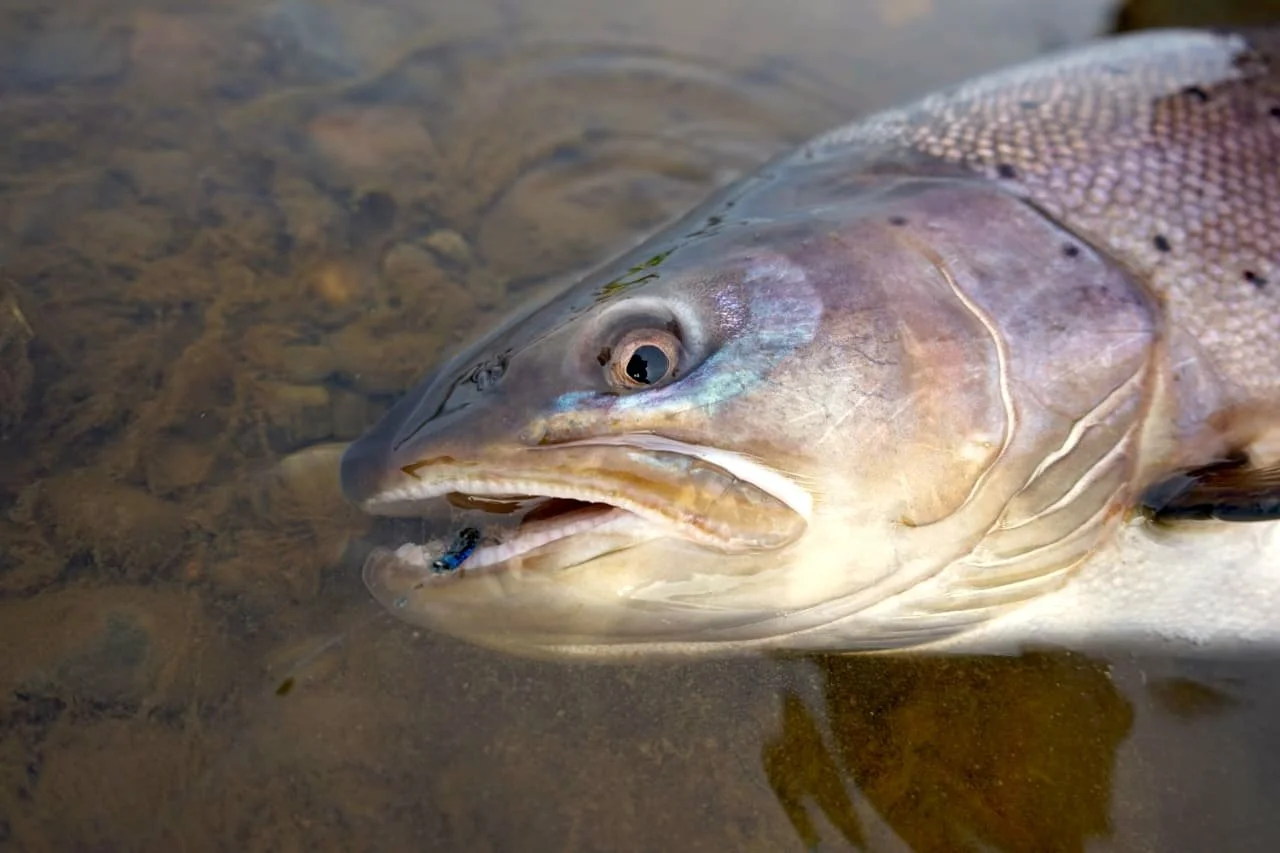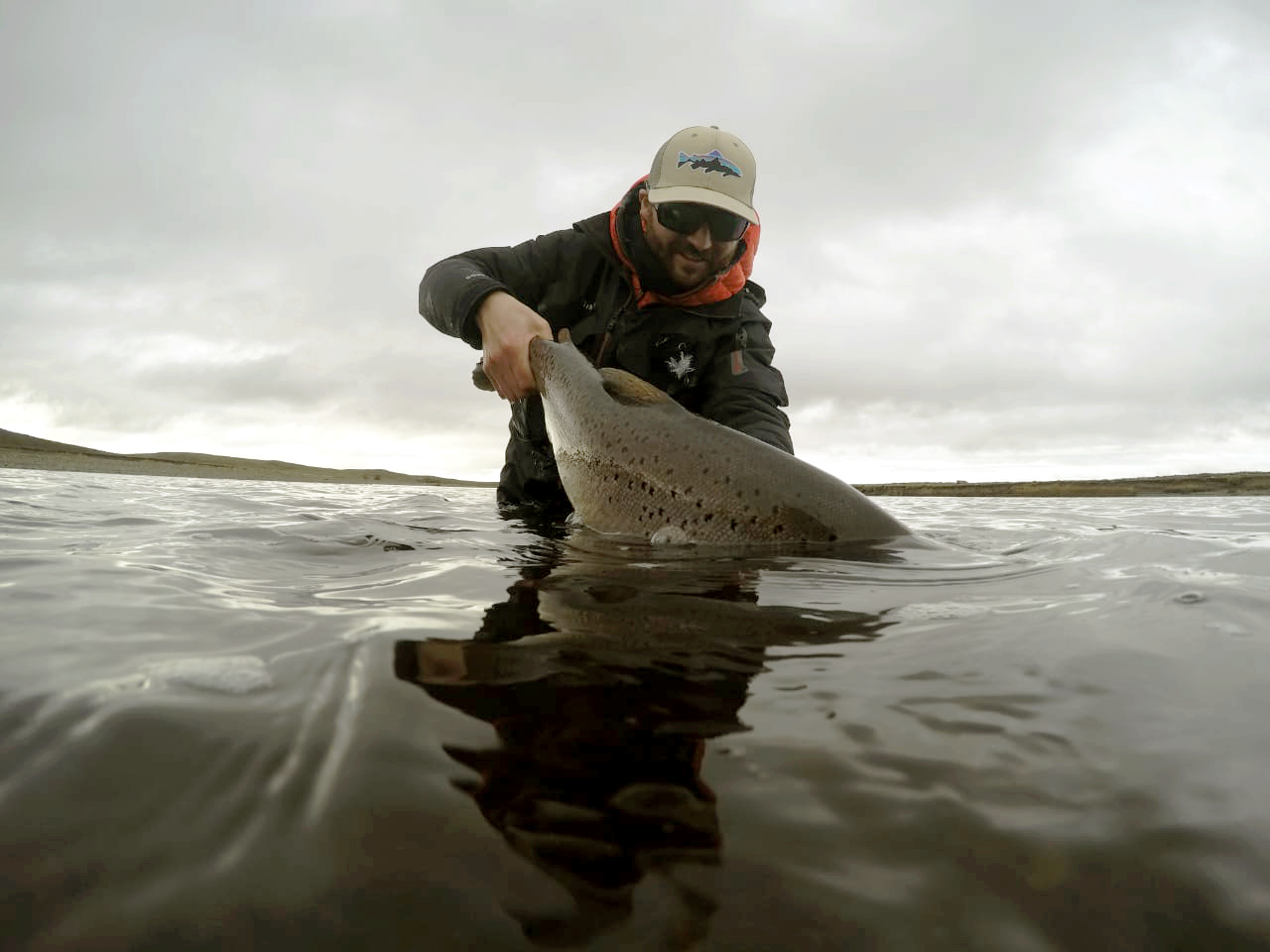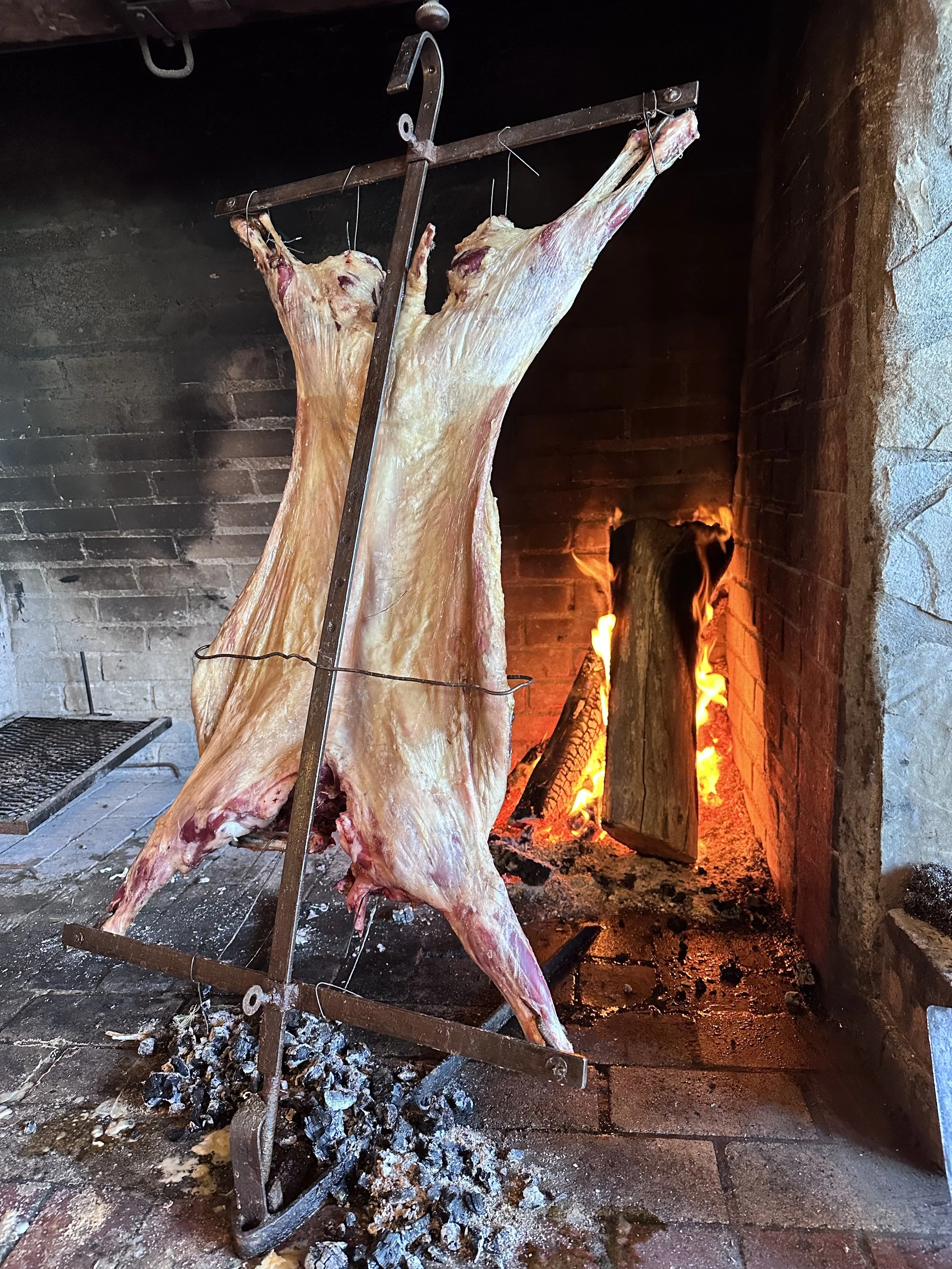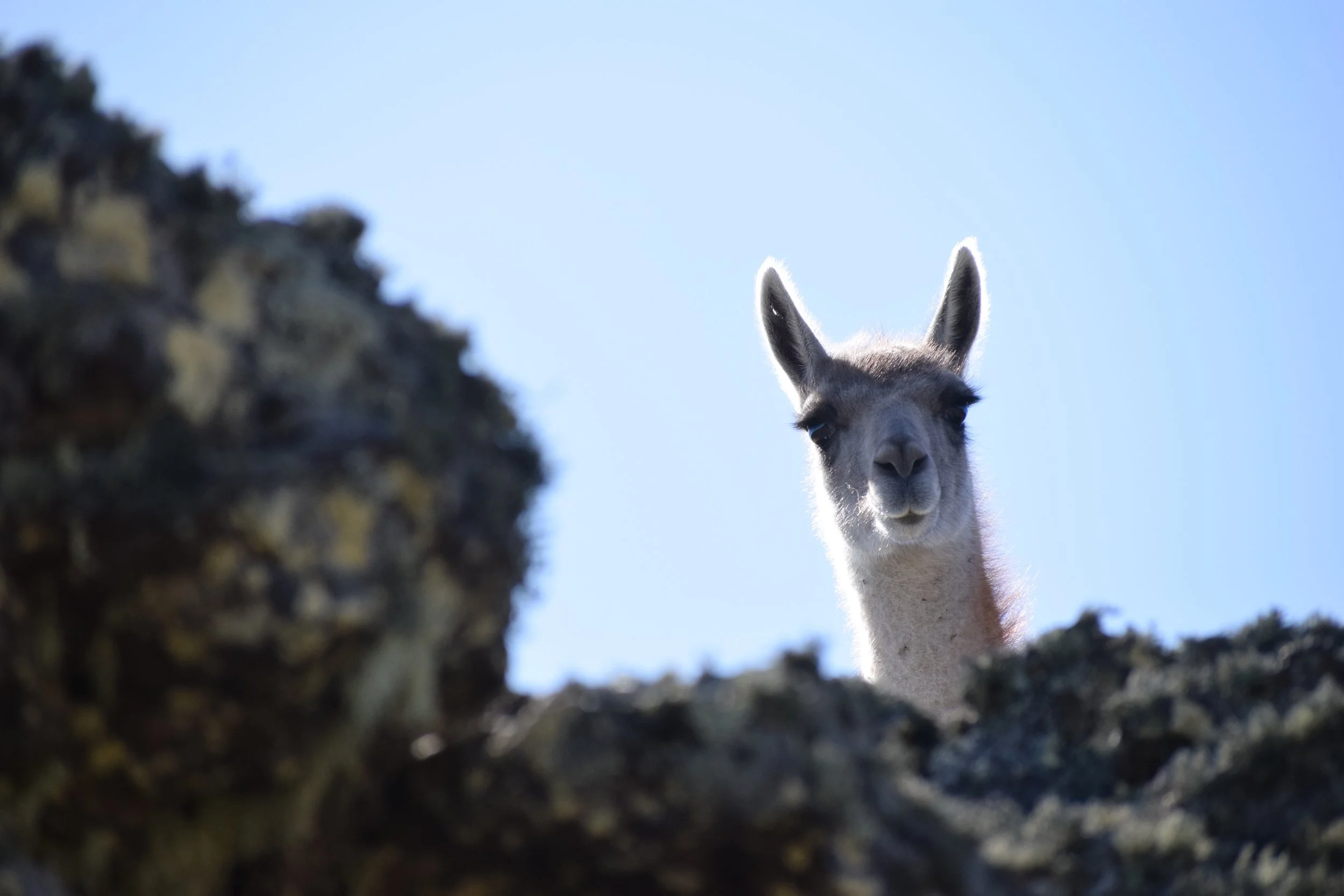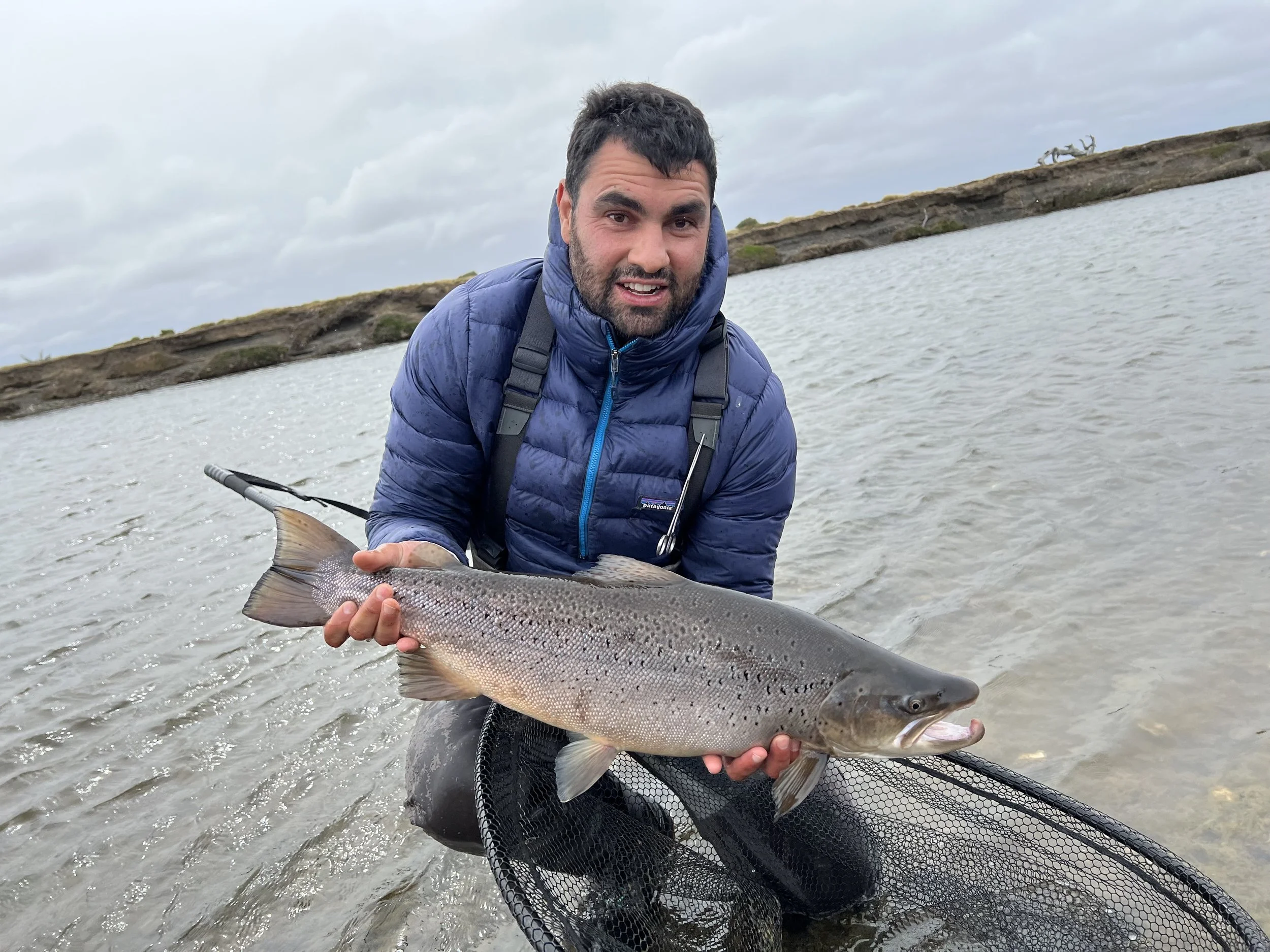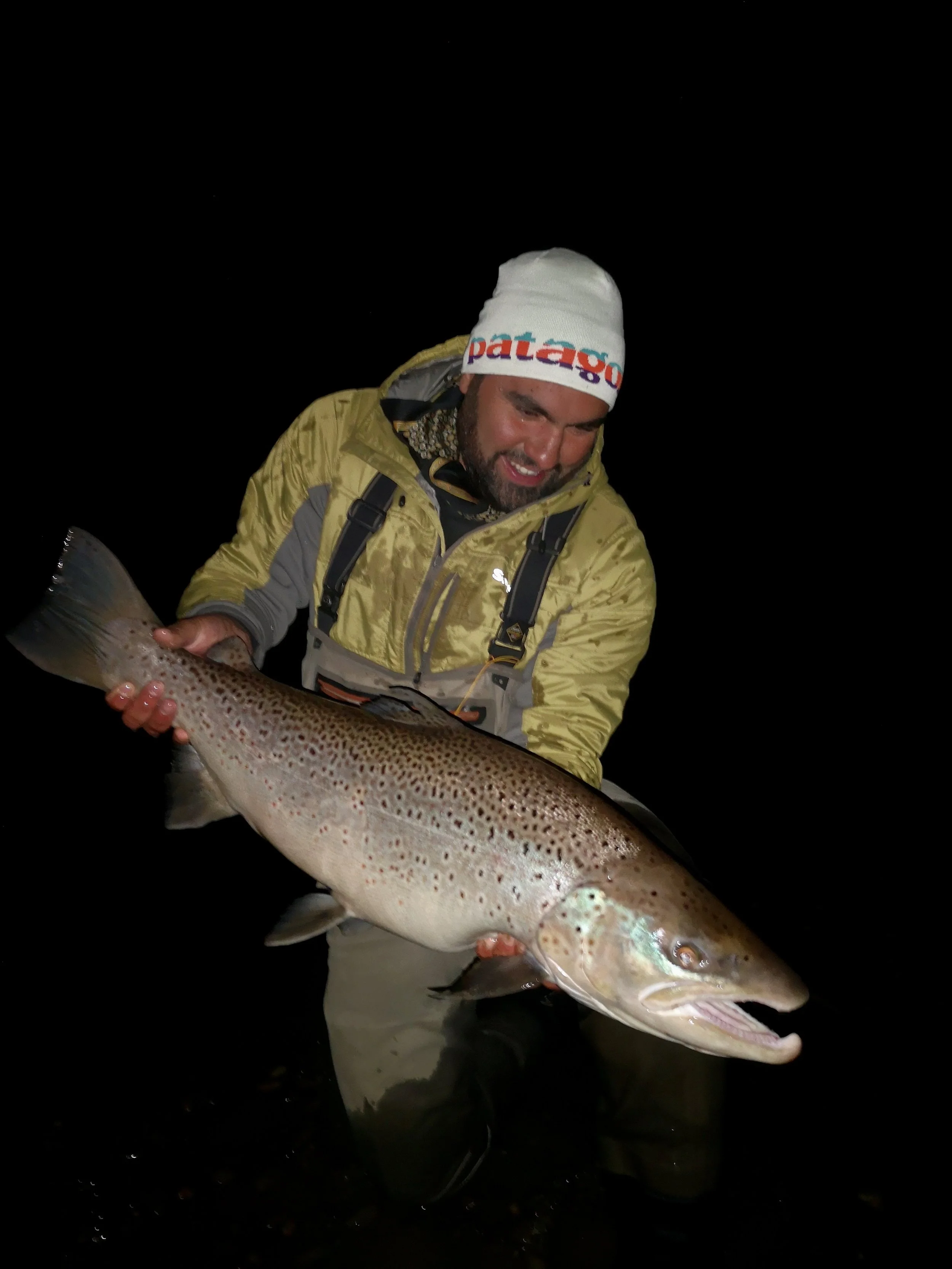WELCOME TO CHILE AND RIO GRANDE LODGE
New for the 2025/2026 season and only with Isolation Outfitters:
Chase the legendary Sea-Run Browns of Tierra del Fuego from the new-refurbished estancia homestead, Rio Grande Lodge.
In every angler’s journey, discovering untouched fly water is a rare and thrilling moment. Now, imagine casting into a newly opened stretch of the iconic Rio Grande – Chilean waters that have remained largely untouched for generations.
Set on a remote 400,000-acre estancia bordering the upper Rio Grande, the Rio Grande Lodge offers exclusive access to a fly fishing frontier: a maze of spring creeks, beaver ponds, lakes, and tributaries, all teeming with wild potential.
This is not just fishing – it’s an expedition into the heart of Patagonia’s most storied sea trout waters.
The 2025/2026 season marks the beginning of a new chapter. Be among the first to explore it.
RIO GRANDE LODGE, TIERRA DEL FUEGO, CHILE
WORLD CLASS SEA-RUN BROWN TROUT FISHING
Each season, up to 85,000 sea-run brown trout migrate through the legendary Rio Grande, making it one of the most productive and consistent fisheries for large anadromous browns anywhere in the world. During the peak months, anglers can expect to hook into powerful sea trout averaging 7 to 17 pounds—with chances at much larger fish.
While much has been written about the Argentinian stretches of the Rio Grande, far less is known about the upper reaches of the river, just across the border in Chile, where fertile, undisturbed farmland and vast estancias hold water that's seen very little angling pressure.
Here lies Estancia Las Segadas, a 400,000-acre working ranch that, along with neighbouring estancias, has been in the same family for two generations. Now the next generation has opened its doors to international anglers for the first time—offering access to pristine, exclusive stretches of the Rio Grande and its diverse network of lakes, spring creeks, tributaries, and beaver ponds.
The Rio Grande Lodge, situated deep within the estancia on the southern bank of the upper Rio Grande, places you in the heart of this wild fishery. To the west flows the Rio Blanco, draining the glacier-fed Lago Blanco, while spring creeks and smaller waterways wind inland across the private lands. This is Patagonia at its most rugged and rewarding.
The Rio Grande is an easily waded river, its gravel bottom shaped by centuries of glacial deposits from the Andes. In Chile, nearly the entire southern bank west of the border is privately accessed, and anglers with Isolation Outfitters enjoy privileged entry to waters that are otherwise unreachable.
Beyond the famed sea trout, this stretch of the Rio Grande also sees runs of King Salmon and Steelhead, and holds populations of resident brown and rainbow trout, along with the occasional Brook Char – making for an unexpectedly diverse angling experience.
After a complete refurbishment over the winter of 2025, the Rio Grande Lodge will welcome its first guests in February 2026. If chasing truly wild sea-run brown trout in un-pressured water is on your bucket list, this is a destination that should not be missed.
FISHING THE RIO GRANDE
The majority of the Rio Grande river system is sited in Chile, west of the border with Argentina. On its true right bank sits Rio Grande Lodge nestled between the Rio Grande and Lago Blanco to the south, with the Rio Blanco flowing nearby.
Prepare for ridiculously strong gusts and constant wind. Calmer days will then be a blessing! The undulating terrain further up the river does provide greater protection from the worst of the wind.
On a positive note, the prevailing winds blowing from the Andes towards the sea do actually assist casting across and downstream. Plus the resultant ripple on the surface, together with shallow water that is stirred up from the wind, helps to hide you and your tippet and flies from these wary fish.
These southern hemisphere sea trout should be fished for with a careful presentation, despite the heavier gear adopted on this mid-sized river. They are easily put down with a careless cast or a fly landed heavily and you can spook the lie with careless and unnecessary casting. Generally, the further up the Rio Grande you fish, the clearer the water can be, so expect less turgid water on the Chilean side than towards the river mouth.
For smaller waters such as the virgin tributaries further up the estancia and the tiny spring creeks, don’t forget to pack a single handed rod of 5 or 6 weight, and matching lines, leaders, lighter tippet and suitable flies.
The estancia comprises pampas grasslands rising into undeveloped foothills, with clear lake-fed streams carving out their winding pathway to the Rio Grande.
Local birdlife includes soaring Andean condors with a wingspan almost as long as your fly rod, gaggles of Greater Magellan geese and some Chimango Caracara (a falcon subspecies).
Expect to see the ubiquitous guanacos and elusive South American grey foxes; perhaps even a rare Fuegian fox (Patagonian red fox) – the second largest native Canid in South America.
DATES
We are now open for limited bookings through February and March 2026. We will close the estancia for spawning from April onwards.
GROUP SIZE
Each group is limited to six anglers.
If you are a single angler or two anglers coming together, we’ll try to accommodate you with another group. Please contact us with your availability for March.
LODGE ACCOMMODATION
Rio Grande Lodge is under major refurbishment until November 2025 and will open in February 2026 with accommodation for a maximum of six anglers in three double rooms, each with an en-suite bathroom. The focus is on home comfort with some exclusive touches.
Dining at Rio Grande Lodge is a critical facet of our operation. Evening meals are centred on enjoying your stories from the day, aided by fine Chilean wines and an array of delicious dishes that combine Chilean heritage with countryside produce.
You‘ll start your day with fresh fruit, freshly ground coffee, and continental or cooked breakfast. Lunch is prepared and packed for the riverside, and accompanies you and your guide to the waiting utility pickup trucks. Upon arrival back to the lodge, enjoy a cold beverage and charcuterie or hors d'oeuvres. Expect some interesting treats as the week progresses.
Underscoring its remoteness, the Lodge has electricity generation onsite (there’s no shortage of hot water) and Internet is via Starlink. We anticipate that you’ll find our lodge accommodation to be up with the best along the entire length of the mighty Rio Grande.
For our first 2025/26 season, the Lodge will host a range of ultra-premium Epic single- and double-handed fly fishing rods with matching reels and lines for visiting anglers to use.
ITINERARY
We recommend spending a day or two to acclimatise and enjoy Argentina’s vibrant culture in Buenos Aires. You’ll then fly down to Rio Grande Airport in Patagonia to start your week with us at Wuijoor Lodge.
Our days begin at 7am, with breakfast served and at approximately 7:30am, the guides have everything ready to leave for the river. At 1pm, we return to the Lodge where our chef and service team are waiting for us with lunch. At 4pm, after a comfortable and restorative nap as is the Argentine way, we don our waders again and head out to the river until 9pm or later depending on the sunset, to finally return to the Lodge for a well-deserved drink, dinner and rest.
EXPEDITION FARE
Our fare is US$5,900 per angler including six nights of accommodation in Rio Grande Lodge including all meals, guiding and your required fishing licence. We also include complimentary road travel transferring you to and from Punta Arenas.
This fare excludes your international return air travel into Santiago and domestic airline transfers to/from Punta Arenas or optional charter flights from Punta Arenas to Aerodromo Pampa Guanaco (only 45 mins from the estancia).
SERIOUS TACKLE REQUIRED
Expect to hook 7lb+ sea-run trout consistently with the right guide, tackle and techniques delivered with experience. You may even get onto some in the 12-15lb range and perhaps even connect with a 20lb+ fish during your week-long visit. With that in mind, stout gear is required for the Rio Grande.
Trout Spey: Using a modern #4-7 weight double handed (10-11 foot long) Trout Spey rod with floating line and intermediate to heavy sink-tip will allow you to cover most water.
Spey: A longer (13 foot long), stronger Spey rod in the #8-9 weight vicinity will also be useful for fighting larger fish and casting heavier flies on Skagit heads.
Casting down and across the pool at an acute 70° angle (or across at 90° for some streamers) allows the fly to sink with an upstream mend. Then swing it back to the near bank keeping a direct connection to the fly. Twitching and short strips vary the presentation and can stimulate a strike.
Single Handed: Single handed medium to fast action modern rods (8 wt) with floating lines and shorter tips can be used on calmer days and with lighter flies on smaller water.
Reels: Make sure you bring quality reels with strong usable drag, minimal startup inertia and decent ergonomics. Pack spare spools if running multiple line options.
Tippet: Pack 0X fluorocarbon or monofilament in the 0.028mm range – and even stronger (16-20lb) if fishing into the evening when the fish are less likely to be leader shy.
The lodge holds additional rods, reels, lines and flies if you’re caught out due to lost luggage or need additional gear.
GENERAL INFORMATION
TRIP ENQUIRIES
Please contact us by sending us a message via our Contact Form, or calling us to discuss availability at Wuijoor Lodge.
After your enquiry, we will share more trip information with you via email and phone, and discuss your fly fishing experience and understand what you’re looking for from this lodge trip.
We have a hosted trip in partnership with Southflyfisher, scheduled for March 2026. If this date aligns with your plans to fish the Rio Grande, please get in touch.
AIRLINE OPTIONS
Flying into Rio Grande Airport (RGA) from the United States requires you to land in Buenos Aires first, switch airports then take a domestic flight. Having a day/night in Buenos Aires to sort any jetlag, acquire some local currency (Blue Dolar) and enjoy a good steak and red wine will set you up for the week ahead.
Check internal flights with your travel agent early on as some flights to RGA depart in the early morning hours (2am or 3.30am at time of writing) so you’ll likely need to be at the airport at midnight.
SATELLITE PHONE/MESSAGING
Our hosted trips with Southflyfisher include access to Iridium Extreme Satellite Telephone and Garmin InReach Mini 2 messaging devices so even when you’re at the lodge or on the river, you’ll always have connectivity to the outside world (assuming that’s what you want!). You can call home, send messages to cellphones as you wish, or message between teams on the river to keep up with the action.
In the event of a riverside medical emergency, we will have direct contact with the lodge and have procedures in place for urgent evacuation to the nearest medical centre. We recommend holding comprehensive cover with Global Rescue to cover any evacuation and medical costs and provide access to high quality medical support.
FARE PAYMENT
The fare for this expedition is outlined on this page in US Dollars (USD$) and will not change after confirmation of your booking, regardless of any fluctuations in international currency, fuel or travel costs. A detailed list of what is included is provided with your booking. Individual anglers are invoiced separately or together as you wish.
Currency: Payment can be made in US Dollars (USD$), on receipt of our invoice, paid into our Montana USA deposit account or via credit card online. If you wish to pay in NZ Dollars (NZD$), we will agree a suitable foreign exchange rate into NZD$ from your preferred currency at the time of booking.
Credit Cards: Alternatively you may wish to pay by credit card. We accept most major international credit cards and can provide a link for online payments.
Deposit: A deposit of 50% of the fare is payable to confirm your booking. Payment of deposit is deemed acceptance of our Terms and Conditions.
Remaining Fare: We require settlement of your full account 30 days before the trip proceeds. If you are a visitor to Argentina, proof of comprehensive travel insurance and any required medical insurance will be required at this point.
Additional Travel or Tackle: We can arrange road or air transfers, and provide fishing gear for you to keep after the trip. Any costs for these will be invoiced directly to you and are payable before the trip commences. Any additional trip preferences, changes to the expedition travel, or specialist gear obtained on your behalf at your request will be payable on invoice.
SINGLE ANGLERS
Whilst our hosted lodge trips are set up for angling groups, we can often accommodate a single angler. Please contact us to discuss this option.
A History of the Rio Grande Fishery
The Rio Grande wasn’t always teeming with salmonoids.
During the 1930’s, Brown Trout ova was reared in Puerto Montt in Chile and fingerlings were released into the Rio Grande’s tributaries. Atlantic Salmon and Rainbow Trout were also released and stocking of Brown Trout continued later in the 20th Century.
Earliest recorded catches of resident fish were in 1937, and by the mid-1950’s there were reports of large sea-run browns regularly being caught.
These fish released into the upper Rio Grande and tributaries took hold in the river system, but outgrew the food supply as smolt, given the low volume of food available to the expanding fish numbers. Fish progressively dropped back downstream and into the ocean to feed and grow before returning to the Rio Grande to spawn after six months.
This anadromous behaviour provided an opportunity for many successful local anglers to harvest these trout and salmon, and the measured population had declined significantly by the mid-1980s.
A ‘catch & release’ requirement was mandated on the Rio Grande in 1986. Anecdotal but reliable (from anglers of course!)reports have confirmed a consistent increase in fish weights over the ensuring years, as a direct result of these regulations.
Sea-run browns spawn annually during the Southern Hemisphere autumn. Trout that have completed four spawning cycles are more likely to weigh in excess of 20lbs.
Catches of this size are now commonplace with an occasional giant 25lb+ Fuegan fish caught each season.


